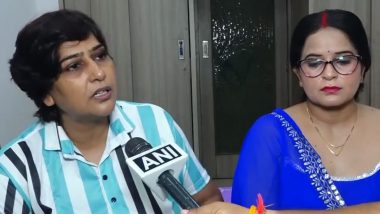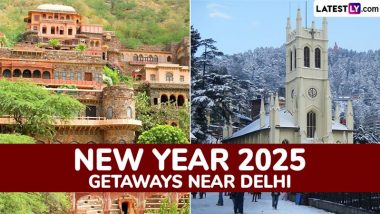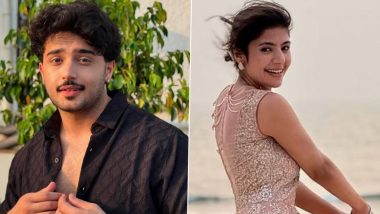Mumbai, June 27: A same-sex couple, Anju and Kavita, recently got married in a traditional ceremony in Gurugram. Kavita expressed her happiness and noted that Anju is very caring. She also voiced her disapproval of society's non-acceptance and the pestering attitude towards them.
"I was aware that our videos would go viral on social media, but it feels bad when people drag my family into it. My partner is extremely caring. I am proud of my decision and very happy with her. It has been two months since our marriage, but we want to adopt an orphan child in the future. We are lucky that our families were so understanding," said Kavita. Same-Sex Marriage in Gurugram: Two Women, Kavita Tappu and Anju Sharma, Tie Knot in Full-Fledged Indian Wedding in Haryana, Pics and Videos Surface.
Same-Sex Marriage in Gurugram
#WATCH | Mumbai: A same-sex couple Anju and Kavita recently got married in a traditional ceremony in Gurugram.
Kavita says, "I was aware that our videos would go viral on social media, but it feels bad when people drag my family into it... She is extremely caring... I am proud… pic.twitter.com/9sc3hdV44X
— ANI (@ANI) June 26, 2024
"The people just keep pestering my brother, father, and brother's 1.5-year-old son, but why should we care about them? My mother is still not okay with our marriage, but it is just a matter of time; she will be fine with our decision. A mother's heart is such," added Kavita. Same-Sex Marriage Judgment: Supreme Court Refuses to Recognise Marriage Equality Rights for LGBTQIA+ Community, Asks Govt to Set Up Committee to Examine Rights of Queer Couples
She mentioned that her partner has been taking proper care of her and has assured her of support. "She is a TV serial artist. I was a makeup artist and worked in Haryana for ten years.
But now I don't work as she has assured me that she will earn, and there is no need for me to work," she explained.
Notably, in 2023, the Supreme Court of India delivered a landmark verdict on the issue of recognizing same-sex marriages.
On October 17, a five-judge Constitution bench of the Supreme Court refused to recognize the right of same-sex couples to enter into marriages or have civil unions and left the decision to the Parliament.
The Supreme Court unanimously stated it cannot strike down the provisions of the Special Marriage Act (SMA) or reinterpret the law to include non-heterosexual couples. The top court heard arguments over 10 days in April and May.
These arguments ranged from the right to equality and privacy to the legal privileges and rights bestowed by marriage and the impact of same-sex marriages on children. Those opposing the petitioners included the Central government, the national child rights body NCPCR, and the Jamiat-Ulama-i-Hind, a body of Islamic scholars.





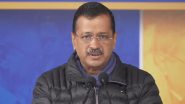
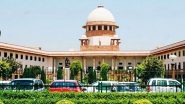






 Quickly
Quickly








